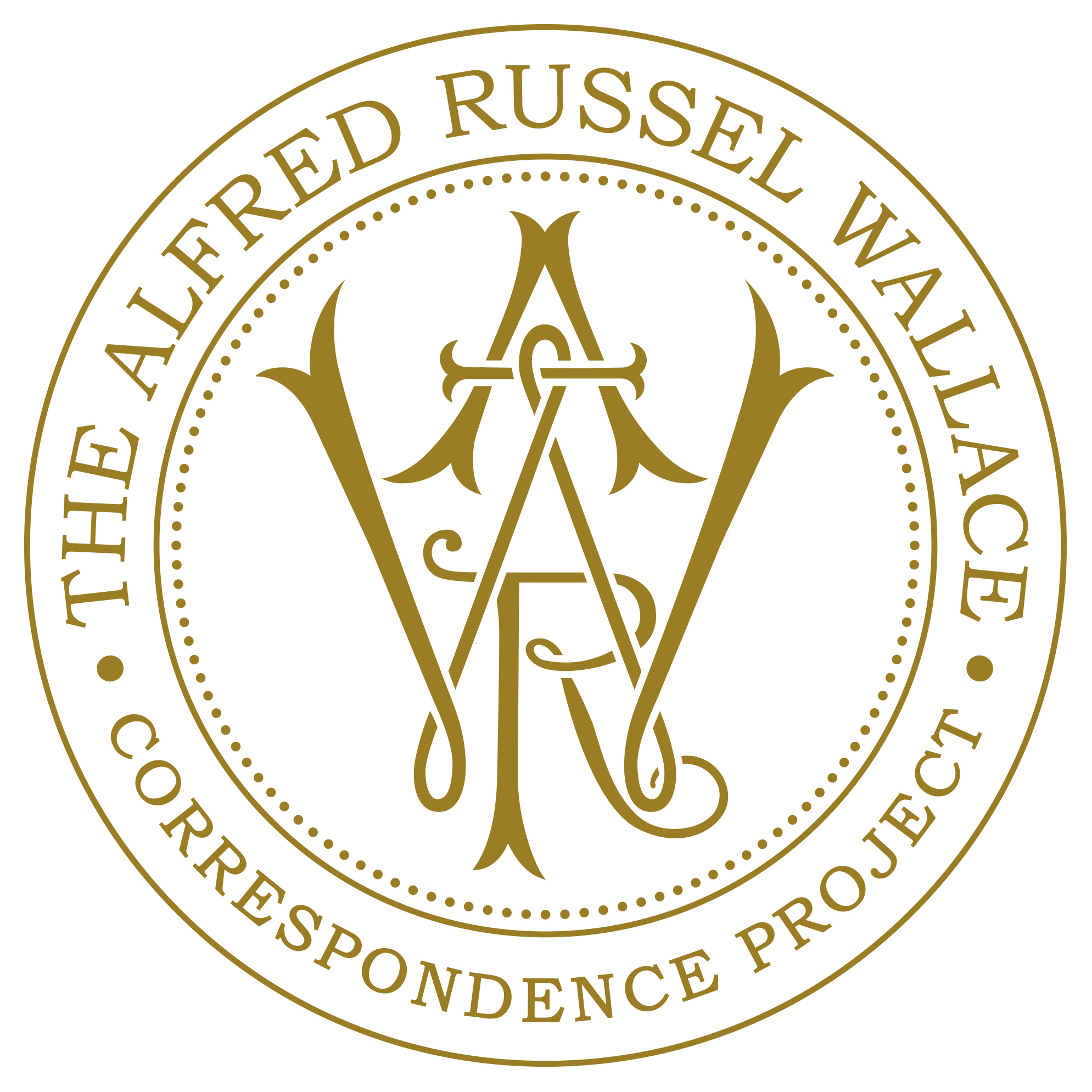|
|
 |
"It is curious how we hit on the same ideas." Charles Darwin to Wallace, 1867
"...there is no more admirable character in the history of science."
Sir David Attenborough, 2011
|
FUNDING FOR OUR PROJECT ENDED ON THE 31ST DECEMBER 2020. WE HAD BEGUN WORK ON VOLUME 1 OF WALLACE'S CORRESPONDENCE (THE LETTERS FROM HIS CHILDHOOD, THE AMAZON AND THE MALAY ARCHIPELAGO) BUT NEED TWO YEARS OF ADDITIONAL FUNDING TO COMPLETE AND PUBLISH IT. IF YOU CAN HELP IN ANY WAY, PLEASE CONTACT Dr GEORGE BECCALONI AT |
Welcome to the Wallace Correspondence Project's (WCP) homepage. This on-going project aims to locate, digitise, catalogue, transcribe, interpret and publish the surviving correspondence and other manuscripts of the extremely important 19th century scientist Alfred Russel Wallace (1823-1913). Wallace has very many claims to fame, not least that he is the co-discoverer with Charles Darwin of the process of evolution by natural selection and the 'father' of evolutionary biogeography. With the possible exception of Darwin, probably no one else in the history of the life sciences has made as many seminal contributions to the field as Wallace, especially to evolutionary biology the foundation of the entire discipline (CLICK HERE). For more information about his life and work CLICK HERE. A selection of noteworthy letters and other manuscripts are listed HERE.
 The Letters
The Letters
Our project has so far located and obtained scans of 5,688 letters, of which 2,748 were written by Wallace and 2,159 were sent to him. The remaining 781 are third party letters which either pertain to him, or were written by Wallace's close relatives and contain information useful to scholars interested in his life and work. The letters were found in 245 public and private collections around the world, and in 245 articles and books. We do not know how many remain to be discovered, but our guestimate is that we have found around 95% of those which survive.
The letters are a biographical treasure trove, and provide a far better picture of the 'real' Wallace than his heavily edited and censored published writings (e.g. his autobiography My Life (1905) or Marchant's Letters and Reminiscences (1916)). For example, Wallace never even mentions the name of his wife (Annie) in any of his published writings, including his autobiography, perhaps out of Victorian propriety. The letters are also key to gaining a deeper understanding of his scientific and other work: how and why his ideas arose, and how they evolved over time. To date, no one has read and studied more than a small fraction of them, largely due to the difficulty and expense of obtaining copies of them from so many disparate sources.
The WCP has unlocked this valuable resource by gathering together all the letters for the first time and transcribing them so that they can be more easily read and information within them discovered using electronic searches for words and phrases. All are now available online, free of charge, in our Epsilon archive, which was launched in 2021 (please note that our old archive Wallace Letters Online is out of date and should not be used). In 2023 we released a 542 page catalogue of the letters, the first ever compiled (see HERE).
The vast amount of unpublished information which is coming to light thanks to our Epsilon archive, is proving to be invaluable to Wallace scholars and our letter transcripts have been, and are being, extensively used for research. Examples of studies which have made extensive use of our archive include: at least one PhD thesis (on Wallace's journey in Amazonia and its influence on the developing science of anthropology in the 19th century), numerous scholarly articles (including, Costa & Beccaloni (2023) Alfred Russel Wallace's unrealized last book, and Stack (2024) Alfred Russel Wallace’s Darwinian opposition to eugenics), a number of important scholarly books (e.g. Wallace, Darwin, and the Origin of Species, On the Organic Law of Change and An Alfred Russel Wallace Companion), and the most detailed biography of Wallace published to date (Radical by Nature: The Revolutionary Life of Alfred Russel Wallace).
It is important to note, however, that the transcripts we have produced so far are 'rough' preliminary versions and contain numerous errors, many of which resulted from the difficulties our volunteer transcribers had in reading the handwritting of more than 1500 different correspondents. Meticulously checking and correcting them will take many years of additional work, for which funding is needed. At present, the only way that scholars can verify the accuracy of a transcript is to compare it to the text of the original physical letter, but unfortunately due to copyright laws and restrictions imposed by owners of these documents, we cannot make the scans we have obtained available to others. This is a situation faced by most correspondence projects. Highly skilled and experienced researchers therefore need to be employed to correct and annotate the transcripts to a level comparable to that achieved by the Darwin Correspondence Project, The Darwin Project has been recently successfully concluded after 49 years of work, and we sincerely hope that our project will ultimately be completed too, so that the entire surviving correspondence of the two co-discoverers of evolution by natural selection will be available to scholars as accurate annotated transcripts which can be relied on.
Our Work, Past and Future
To date we have achieved the following:
- we have obtained 26,819 digital images of 7,409 documents (6,925 documents representing 5,688 letters, and 476 other non-letter manuscripts).
- we have catalogued the documents using our project's database.
- 171 volunteers have produced draft electronic transcriptions of all of the letters (we call these "Level 1" transcripts).
- we have written summaries of 1,438 letters.
- our researchers have carefully edited 1,004 Level 1 transcripts and written scholarly endnotes for them to help the reader better understand the text (we call these "Level 2" transcripts). This research is highly skilled and very time-consuming.
- We have published a catalogue listing all known letters (see HERE).
- We have put our preliminary transcripts of the letters into the online Epsilon database, which is hosted by Cambridge University Library, UK.

What we still need to do (additional funding required):
- researchers need to edit 4,768 Level 1 transcripts and write scholarly endnotes for them.
- all letter metadata needs to be carefully checked.
- researchers need to write summaries for 4,250 letters.
- the 1,592 correspondents who authored/received letters, plus the more than 2,000 other people mentioned in the letters, need to be further researched, and concise biographies written for them.
- the project needs to continue to attempt to locate undiscovered letters in repositories worldwide and obtain images of them. We believe that many hundreds still remain to be found.
- a Wallace specialist (the project's Director) needs to edit all of the Level 2 transcripts and the endnotes written by the researchers. These edited transcripts will be of 'publishable quality'. We call them "Level 3" transcripts.
- concurrently with the above, the project plans to publish the Level 3 transcripts in a series of printed volumes entitled The Correspondence of Alfred Russel Wallace. We estimate that the correspondence will ultimately fill 10-11 600 page volumes, each taking two full-time staff about three years to produce. The project is currently seeking funding to produce volume 1, which will contain all letters from Wallace's childhood, up until his return from the 'Malay Archipelago' in 1862.
See our online archive of Wallace's correspondence by clicking this logo:
"Thank you for putting together the correspondence project, it’s a true goldmine and it’s extremely well-done."
Prof. Christophe Thébaud, evolutionary biologist, University of Toulouse, France, 2022
From a review of James Costa's 2023 prize-winning biography of Wallace, Radical by Nature: "Why read this biography? In fairness, other biographies provide details omitted here. Far more important, however, is what Costa adds. Much unpublished information has come to light since the 2013 centenary and Costa has drawn extensively on the archive of material that Wallace’s grandsons had. This was gradually annotated and digitised from 2010 onwards as part of the publicly accessible Wallace Correspondence Project and has allowed Costa to add much intimate detail from hundreds of personal letters."
************************
If you know of any letters or other manuscripts which you think we might not yet have found, we would be extremely grateful if you could contact Dr George Beccaloni, the Director of the project, at this email address: g.beccaloni@wallaceletters.org

Please note that most repositories who have kindly supplied images of documents to us for research purposes have not granted us permission to display them on this website or to otherwise make them available to third parties. This is a major reason why we need to produce high quality transcripts of them and make them available online.
Common variations of Wallace's name:Wallace; Alfred Wallace; A. R. Wallace; Alfred R. Wallace; Russel Wallace; Alfred Russell Wallace [sic]
Wallace Letters Online; Wallace in Epsilon; Wallace Letters
This site is maintained by George Beccaloni Director of the Wallace Correspondence Project and CEO of the Alfred Russel Wallace Trust
This page was last updated in December 2024





